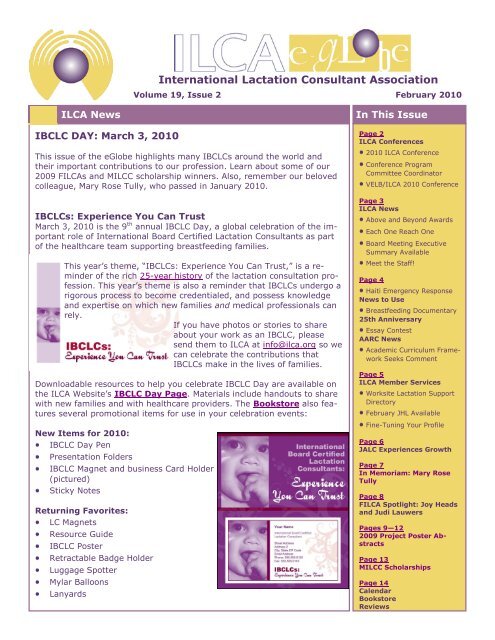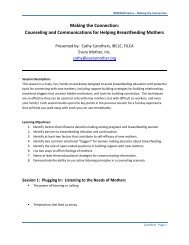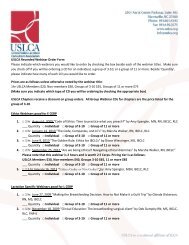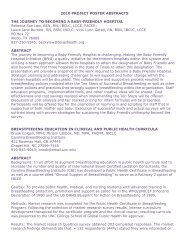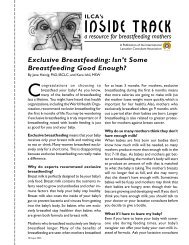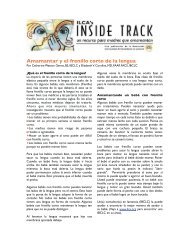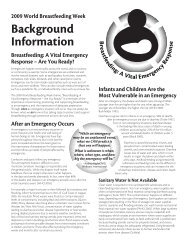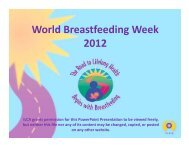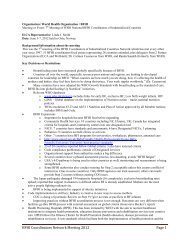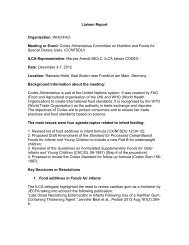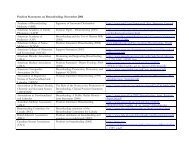International Lactation Consultant Association
International Lactation Consultant Association
International Lactation Consultant Association
You also want an ePaper? Increase the reach of your titles
YUMPU automatically turns print PDFs into web optimized ePapers that Google loves.
Page 2<br />
ILCA Conferences<br />
2010 ILCA Conference – ILCA’s 25 th Anniversary<br />
ILCA Conference Speakers!<br />
Enjoy presentations by the following colleagues<br />
at the 2010 ILCA Conference in<br />
San Antonio!<br />
Conference Program Now Available<br />
Online Registration is Now Open<br />
ILCA Seeking Conference Program Committee<br />
Coordinator<br />
Applications will be accepted until March 1 for the paid position<br />
of Conference Program Committee Coordinator. This position will<br />
chair the conference planning committee for the annual conferences<br />
in 2011 in San Diego, California and in 2012 in Orlando,<br />
Florida. The committee determines the conference theme, invites<br />
plenary speakers, and selects workshop and concurrent topics<br />
and speakers through an abstract review process. ILCA provides<br />
an honorarium and reimburses the coordinator‟s expenses related<br />
to attending the conference.<br />
Learn more about this exciting opportunity at the CPC page at<br />
http://www.ilca.org/i4a/pages/index.cfm?pageID=3371 or by<br />
reviewing the Job Description. Download an http://www.ilca.org/<br />
files/members_only/volunteer_opportunities/<br />
ConferenceProgramCmte/CPCCoordinatorApplication2.pdf or contact<br />
Natalie Porterfield, Director of Conference Services at natalie@ilca.org<br />
with questions.<br />
Kathleen Kendall-Tackett:<br />
“Sexual Abuse and Assault in the<br />
Lives of Childbearing Women” and<br />
“Where do babies sleep? Results<br />
from the survey of mothers‟ sleep<br />
and fatigue.”<br />
VELB/ILCA 2010 Conference: Abstract Submission<br />
Final Call<br />
Don‟t delay in submitting your abstract to present at the upcoming<br />
VELB/ILCA biennial conference to be held October 21-23,<br />
2010 in Basel, Switzerland. You may download the English version<br />
of the abstract application from the ILCA Conferences pages.<br />
Please send your entire application exclusively to velb2010@tsmanagement.ch.<br />
General information on the conference can be<br />
found on the ILCA Worldwide Education Calendar. Deadline is<br />
February 28, 2010.<br />
IBLCE Exam at the Conference Site<br />
The JW Marriot will serve as an official 2010 IBLCE Examination<br />
site on Monday, July 26. Contact info@iblce.org for additional information.<br />
All Conference attendees planning to take the exam<br />
on Monday are invited to a free ILCA workshop on Sunday afternoon.<br />
The workshop will present test-taking tips and relaxation<br />
strategies to help exam candidates prepare for Monday.<br />
Roberta Graham de Escobedo:<br />
“Promoting Optimal Breastfeeding<br />
in the Latino Community”
Page 3<br />
ILCA News<br />
ILCA Above and Beyond Award Nominations Sought!<br />
Each year ILCA presents the "Above and Beyond" Award to a member who has shown their commitment<br />
of time and talent to their professional association. The Above and Beyond Award winner will receive a<br />
two-year ILCA membership. Any ILCA member may be nominated, and you may even nominate yourself.<br />
Simply describe, in 150 words or less, why the award should be given to the person you've named.<br />
The winner is selected by the ILCA Board of Directors after consideration of the nominations provided.<br />
The nomination form is on the ILCA Website at http://www.ilca.org/i4a/pages/Index.cfm?pageID=3485.<br />
Please send your completed nominations by April 15 to Roberta Graham de Escobedo , Director of<br />
Membership and Affiliate Services, via the ILCA office or by email to roberta@ilca.org.<br />
EACH ONE REACH ONE in a 3-way tie!<br />
As of this moment we have a 3-way tie in the INDIVIDUAL category. Amazingly, three people have each<br />
introduced 5 new members, so unless they bring in more, it looks like a tie! Another member is fast on<br />
their heels with 4 to her credit. A tie is resolved by random drawing, but there's still time for a member<br />
to pull ahead and win the complimentary conference registration for the 2011 conference in San Diego,<br />
California, USA. Make sure anyone you refer to ILCA mentions YOU when they apply for membership.<br />
The EORO challenge ends on June 30, 2010.<br />
EORO for Affiliates and Chapters<br />
Don‟t forget that an Affiliate or Chapter that recruits at least 15 new ILCA members could win a 2011<br />
Main Conference Registration. We currently have one Chapter with 5 new members, and two with 3<br />
each. If your Chapter has introduced new members, you may send their names and we will be happy to<br />
check their records to see if they gave you credit.<br />
Executive Summary of ILCA Board Meeting Now Available<br />
The Executive Summary of the Meeting of the ILCA Board of Directors, held in November 2009, is now<br />
available on the ILCA website on the Members Only side under <strong>Association</strong> Business.<br />
Meet the Staff!<br />
Pictured here are staff from ILCA, USLCA, and CLCA/ACCL, working out of the Morrisville Office.<br />
(Left to Right) Lisa Joncich, Vicki<br />
Hobbs, Natalie Porterfield, Judi<br />
Lauwers, Glenna Thurston, Scott<br />
Sherwood (USLCA), Lee Campbell<br />
(CLCA), Jim Smith, and Liz Koroly.<br />
You can learn more about them at<br />
the Staff Page of the ILCA Website.
Haiti Emergency Response<br />
Haiti Recovery: Monetary Donations<br />
Best<br />
ILCA members have been concerned over the<br />
heartbreaking devastation in Haiti. Donations of<br />
money are most needed by relief organizations.<br />
Such monetary donations can help to import necessities<br />
as well as purchase locally-produced<br />
foods and other items as part of relief and rebuilding<br />
efforts. Such monetary donations can<br />
also insure that appropriate foods are being<br />
made available to infants and young children, in<br />
accordance with guidelines by the World Health<br />
Organization, the World Food Programme, and<br />
UNICEF as well as “Operational Guidance for Infant<br />
Feeding in Emergencies" by the IFE Core<br />
Group.<br />
Mothers, colleagues, and friends who wish to donate<br />
to relief efforts should send their monetary<br />
gifts to UNICEF, Save the Children Alliance,<br />
World Vision, and Action Against Hunger. These<br />
organizations are using best practice to aid both<br />
breastfed and non-breastfed infants. Members of<br />
the public can be confident that donations to<br />
these organizations will support breastfeeding<br />
and help save the lives of babies.<br />
News to Use<br />
Breastfeeding Documentary Now Available<br />
“Breastfeeding: Making the Connection” is a recently-released<br />
documentary which examines the<br />
various influences on parents<br />
when choosing how to feed their<br />
babies. These influences are well<br />
-known to lactation consultants,<br />
including lack of evidence-based<br />
information and the aggressive<br />
marketing by formula manufacturers<br />
which undermine activities<br />
in birthing hospitals. The documentary also offers<br />
actions which can improve breastfeeding outcomes,<br />
including the implementation of the Baby<br />
-Friendly Hospital Initiative. DVD copies of the<br />
documentary are available through INFACT Canada,<br />
http://www.infactcanada.ca. The project<br />
was funded in part by a WABA community support<br />
seedgrant.<br />
25th Anniversary<br />
Essay Contest<br />
ILCA and IBLCE are celebrating the 25 th anniversary<br />
of our profession with an essay contest, “How<br />
IBCLCs Make A Difference.” Sponsored by the 25th<br />
Anniversary Task Force, the contest provides<br />
IBCLCs an opportunity to submit a short essay (500<br />
words or less) on how they “make a difference” in<br />
their role as an IBCLC.<br />
ELIGIBILITY: The contest is open to any IBCLC with<br />
current, non-expired IBLCE certification. One does<br />
not need to be an ILCA member to participate.<br />
HOW TO ENTER: Entrants will submit their essays<br />
via email to Vicki Hobbs at vicki@ilca.org. Include<br />
the full name and email address at the top of the<br />
essay page. Contest submissions will be accepted<br />
electronically through April 15, 2010.<br />
WINNER SELECTION: The 25th Anniversary Task<br />
Force will select 1st, 2nd and 3rd place winners.<br />
Notification of awards will be sent to all participants<br />
via email after June 15. Winning essays will be<br />
posted on the eGlobe and both the ILCA and IBLCE<br />
websites. Other entries will be posted on the ILCA<br />
25th Anniversary page. Recognition of the winning<br />
essay will take place at the ILCA Conference in San<br />
Antonio, Texas.<br />
CONTEST AWARDS: Contest winners will receive<br />
ILCA Continuing Education modules and USLCA webinars<br />
of their choice.<br />
First place receives three ILCA modules and three<br />
USLCA webinars<br />
Second place receives two ILCA modules and two<br />
USLCA webinars<br />
Third place receives one ILCA module one USLCA<br />
webinar<br />
Celebrate your profession‟s milestone anniversary<br />
by sharing your thoughts on “How IBCLCs Make A<br />
Difference!”<br />
AARC News<br />
Academic Curriculum Framework Seeks<br />
Comment<br />
Time is running out to submit your comments on<br />
the draft of Framework for Development of an Academic<br />
Program in Breastfeeding and Human <strong>Lactation</strong>.<br />
The document is posted on the public discussion<br />
board on the ILCA website. Deadline for comments<br />
is February 15. Please refer to page and line<br />
numbers or table rows when submitting comments<br />
so the context can be located easily. Contact Judi<br />
Lauwers at judi@ilca.org with any questions.
Page 5<br />
ILCA Member Services<br />
Worksite <strong>Lactation</strong> Support Directory<br />
Supporting working mothers is a key component of increasing the duration of breastfeeding. Sign up for<br />
ILCA‟s Worksite <strong>Lactation</strong> Support Directory to connect with area businesses that might be interested in<br />
developing or growing a worksite lactation support program. This places you in a listing employers can<br />
access on the ILCA website homepage.<br />
The form is available on the Worksite <strong>Lactation</strong> Support page, accessed through the Members Only side.<br />
Also, remember to be available to working mothers by listing your services in the “Find a <strong>Lactation</strong> <strong>Consultant</strong>”<br />
directory.<br />
February JHL in Your Mailbox AND On-Line<br />
You may access each issue of the Journal of Human <strong>Lactation</strong> on-line through the Members Only side of<br />
the ILCA website. All articles and commentaries can be downloaded by members as free PDF files. The<br />
table of contents for the February 2010 issue is available at http://jhl.sagepub.com/content/vol26/<br />
issue1/?etoc.<br />
Fine-tuning your ILCA Membership Profile<br />
With the new membership year, be sure to give your member Profile a Tune-up!<br />
Log onto the Member‟s Only side and select “Edit My Profile” and then “Custom” to make help you make<br />
your profile rich and exciting. For questions with multiple selections, hold down the CTRL key while you<br />
select each one.<br />
Credentials: List your credentials and/or degrees (e.g., RN, MD, IBCLC).<br />
IBCLC? Answer True or False to indicate whether you are an IBCLC.<br />
IBCLC number: In most cases, this is an 8 digit number.<br />
IBCLC recertification date: The year you need to recertify to maintain your credential.<br />
Areas of Practice: Indicate all areas where you.<br />
Languages: Indicate all languages in which you are proficient enough to answer a mother‟s questions,<br />
including English. If your language is not found on the list, please email info@ilca.org.<br />
Areas of Expertise: Indicate all areas in which you feel you have enough expertise and knowledge<br />
to help a mother.<br />
Opt Out: The default for the next three questions is FALSE. If you change it to TRUE you will NOT<br />
receive the member benefit. Leave this as FALSE if you DO want to receive it.<br />
Membership Directory: Only other ILCA members have access to this feature. It enables members<br />
to locate you easily.<br />
FALC (Find a <strong>Lactation</strong> <strong>Consultant</strong>) Directory: This public listing enables mothers or family<br />
members to find assistance with breastfeeding. You must be an IBCLC to be listed. If you wish to<br />
be listed, on the Address screen select “Add New” and then “FALC Address.” Also list a phone<br />
number or email address. Most mothers who call the ILCA office looking for assistance prefer a<br />
phone number.<br />
Mailing Labels: ILCA occasionally rents out member addresses for conferences, exhibitors, publishers,<br />
and other businesses that are Code compliant. Telephone and email information are not<br />
released. The ILCA Board of Directors reviews the mailing to be sure it is information the majority<br />
of our members will want to receive.<br />
EORO—Individual, Course Director, or Chapter /Affiliate: This area is available only for NEW<br />
members at the time they join. If you did not enter a name at the time you joined, you may email<br />
the information to info@ilca.org and we will enter it in your record.
Page 6<br />
Affiliate News<br />
Japanese <strong>Association</strong> of <strong>Lactation</strong> <strong>Consultant</strong>s Experiences Major Growth<br />
The lactation consultant profession is growing by leaps and bounds in Japan. The Japanese <strong>Association</strong><br />
of <strong>Lactation</strong> <strong>Consultant</strong>s (JALC) was founded by a tiny group of just four dedicated and passionate<br />
IBCLCs in the country in 1999. Today, just 10 years later, there are approximately 650 IBCLCs in the<br />
country, and JALC has mushroomed into a strong and vital organization of 573 IBCLC voting members<br />
and 1,292 non-voting (non-IBCLC) members.<br />
Hiroko Hongo, Cathy Carothers, and Tomoko Seo<br />
Two of the organization‟s past presidents, Hiroko<br />
Hongo and Tomoko Seo, attribute the rapid growth<br />
to training, education, and a multi-disciplinary, collaborative<br />
approach. Tomoko, a pediatrician who<br />
will soon begin a term on the board of the <strong>International</strong><br />
Board of <strong>Lactation</strong> <strong>Consultant</strong> Examiners<br />
(IBLCE), serves as head of the translation division.<br />
She says that JALC offers four conferences each<br />
year which are widely attended, including two conferences<br />
for anyone interested in breastfeeding,<br />
which attracts over 1,000, a conference for IBCLCs,<br />
and an additional conference for physicians. She<br />
has also committed to translating many breastfeeding<br />
documents and resources, and is working with<br />
ILCA to translate the popular “Clinician‟s Triage<br />
Tool” which will be published soon.<br />
Hiroko, one of the JALC co-founders who also serves as a La Leche League Leader, serves as Chief<br />
Trainer of Continuing Education, Committee for Education of JALC. She says the multidisciplinary approach<br />
has been key to JALC‟s growth and acceptance.<br />
“In our culture, most professional organizations have patriarchical<br />
top-down relationships, where the younger respects<br />
the older,” she says. “At JALC, every IBCLC is equal in terms<br />
of breastfeeding supporters. As one of the co-founders, I<br />
have strongly believed that being accepted as a person and<br />
being empowered with evidence-based information is very<br />
important in order to accept and empower mothers with appropriate<br />
information. Many members say they continue to<br />
remain involved with JALC because they feel accepted and<br />
welcomed.”<br />
She says that meetings and trainings are fun (one participant<br />
commented that it is like Disneyland because she feels<br />
so welcomed) and that mothers with their breastfeeding babies<br />
and children are welcomed, something that is not typical<br />
in other professional settings in Japan. “IBCLCs are good<br />
role models to other health care professionals to follow in<br />
many ways.”<br />
Mt. Fuji, Japan
Page 7<br />
In Memoriam<br />
Remembering Mary Rose Tully<br />
Mary Rose Tully passed on January 20, 2010 after a long battle with pancreatic<br />
cancer. She was a long-time, influential member of ILCA and served on the<br />
Board. She was also a founding member of the Human Milk Banking <strong>Association</strong><br />
of North America (HMBANA). She was Director of the Department of <strong>Lactation</strong><br />
Services at the University of North Carolina's Women's Hospital, and Adjunct<br />
Clinical Instructor (Pediatrics) at the University of North Carolina's School of<br />
Medicine, and long-time director of the WakeMed Milk Bank in Raleigh, North<br />
Carolina, USA.. Mary Rose is survived by Douglas Blair Tully, her husband of 42<br />
years, her son Christopher Paul Tully, his wife, Tania Georgiou Tully and their<br />
daughter, Anika, all of Raleigh; her mother, Rose, and her four sisters and two<br />
brothers. Donations may be made to the MRT Educational Fund, c/o Karen Britt<br />
Peeler, Attorney at Law, P.O. Box 12154, Raleigh, NC 27605.<br />
Mary Rose is remembered here by Mary Overfield, her long-time friend and collaborator.<br />
For those of you who don‟t know me, I‟m Mary Overfield, and Mary Tully and I have been friends for<br />
over 36 years. So many people have asked me – How did you and Mary become friends? I have to say<br />
it was Chris‟ fault! We had moved to Raleigh from Denver and didn‟t know anyone, so I went to a<br />
Nursing Mothers of Raleigh meeting. A little boy came over to play with my two-year old son Darren.<br />
His mother introduced herself and invited us to their house for lunch. I never imagined that lunch<br />
would lead to all that Mary and I have gotten to do together.<br />
When Mary‟s family asked me to give a 3 minute remembrance today, I thought of everything: from<br />
how my wonderful Catholic friend taught me to make Jewish Apple Cake to the incredible opportunity<br />
we have shared teaching the <strong>Lactation</strong> <strong>Consultant</strong> Comprehensive Update Course - the LCCU - for the<br />
past 17 years. I can‟t share all of my “Mary T” stories with you today, but I‟ll share a few.<br />
In 1977, Dr. Jim Thullen hired Mary to conduct a portion of the NIEHS Research Infant Feeding Study<br />
at WakeMed. To thank the pediatricians for allowing the data collection, she started helping their patients<br />
with breastfeeding. When the study ended, the doctors lobbied the hospital to hire her. In 1985,<br />
when it became possible to earn international board certification as a lactation consultant, Mary was in<br />
the first group to earn her IBCLC. Her work has been instrumental in the acceptance of the lactation<br />
consultant as a member of the health care team.<br />
In the late 1980‟s, we created our book, The Breastfeeding Counseling<br />
Guide, and used it to train Nursing Mother of Raleigh volunteers.<br />
Our group donated to the first human milk bank in North<br />
Carolina, The Piedmont Mothers‟ Milk Bank, using Mary Tully‟s<br />
kitchen table! With the discovery of HIV/AIDS, the Milk Bank had<br />
to process the donated milk, so Mary wrote a grant proposal that<br />
resulted in the WakeMed Mothers‟ Milk Bank. She played a big role<br />
in the formation of the Human Milk Banking <strong>Association</strong> of North<br />
America and in writing the official guidelines for all milk banks.<br />
Mary‟s over-arching vision has been that every mother who wants<br />
to breastfeed should have the help she needs. Providing that help requires training and resources. So<br />
many people have contributed to this dream. For example, WakeAHEC‟s Diane Yelverton coordinates<br />
the LCCU course and the Art of Breastfeeding Conference – this year will be the twentieth. The In-<br />
Home Breastfeeding Support Program we helped create with Susan Baker, who is now in Colorado,<br />
Jam Gourley and Ruth Valois continues with Jam in the WIC Program. Mary had been active with the<br />
US Breastfeeding Committee at the national level, but when the NC Breastfeeding Coalition was created<br />
with many of the people here today, it was certainly a dream fulfilled for Mary. In fact, when she<br />
first got sick, Mary was in Washington, DC, for a US Breastfeeding Committee meeting working to define<br />
how breastfeeding was to be included in our US Healthy People 2020 National Goals. Her impact is<br />
indeed felt across the nation and world, but nowhere as much as right here!
Page 8<br />
Members in the News<br />
FILCA Spotlight: Joy Heads and Judi Lauwers<br />
Joy Heads OAM, RN; RM; Grad Cert. Bioethics, MHPEd, IBCLC, FILCA, Bronte, NSW, Australia<br />
Joy began her involvement with breastfeeding and human lactation with the birth of<br />
her twins in 1975 when she joined the Nursing Mothers <strong>Association</strong> of Australia (now<br />
the Australian Breastfeeding <strong>Association</strong>). Qualifying as a Breastfeeding Counsellor<br />
in 1978, she was the first Group Leader of the Bondi Junction NMAA Group. She became<br />
a trainee advisor with NMAA and was on the first Editorial Board of<br />
“Breastfeeding Review.”<br />
Joy has been continually certified as an IBCLC since 1986. She is a registered nurse<br />
and midwife and in 1986 also started her formal teaching of lactation in her role as<br />
midwifery educator at the Royal Hospital for Women (RHW), a tertiary referral<br />
women‟s hospital in Sydney with over 3500 births per year. She became the Clinical<br />
Nurse <strong>Consultant</strong> – <strong>Lactation</strong> in 1989 and has guided RHW through three BFHI accreditations,<br />
the most recent being 2008. Joy graduated from the University of New<br />
South Wales in 2000 with a Master of Health Professional Education. “Still the greatest pleasure I have<br />
in life is working with pregnant and newly delivered parents,” Joy says. “Enabling them to have the<br />
confidence and self efficacy to trust their own instinct when faced with the myriad of parenting and<br />
breastfeeding „rules‟ that exist in a westernised counrtry.”<br />
One of Joy‟s special interests has been the birth and development of the New South Wales <strong>Lactation</strong><br />
College. She was the inaugural president in 1997 and was awarded Life Membership at the 2008 Annual<br />
General Meeting and Conference. She has published several papers and has contributed to ILCA‟s<br />
Core Curriculum for <strong>Lactation</strong> <strong>Consultant</strong> Practice.<br />
In 2006 Joy received an Australian national honour when she was awarded the Order of Australia<br />
Medal (OAM) for …”service to nursing and midwifery as a specialist lactation consultant and to health<br />
professional and parent education.” About this award, Joy says “This was an amazing experience considering<br />
I am a direct descendent of „First Fleet‟ convicts to arrive in Australia. My great, great, great<br />
grandmother and grand father were transported for stealing a „bolt of cloth‟ in Manchester. The USA<br />
got the puritans…. Australia got the convicts !!”<br />
Judith Lauwers, BA, IBCLC, FILCA – Chalfont, PA, USA<br />
Judi is a founding member of ILCA and was an inaugural member of ILCA‟s conference<br />
committee and Journal of Human <strong>Lactation</strong> staff as editor of<br />
“<strong>Consultant</strong>‟s Corner.” She has participated on the conference as a committee<br />
member, committee chair, and conference planner. Judi served two terms on<br />
the ILCA Board of Directors as Director of Professional Development. She served<br />
on the Panel of Experts for the first IBLCE exam and has recertified every five<br />
years since.<br />
Judi is the author of Quick Reference for the <strong>Lactation</strong> Professional, Counseling<br />
the Nursing Mother: A <strong>Lactation</strong> <strong>Consultant</strong>'s Guide, Pocket Guide to Counseling<br />
the Nursing Mother and Breastfeeding Today: A Mother’s Companion. She is a<br />
contributing author to ILCA‟s Core Curriculum for <strong>Lactation</strong> <strong>Consultant</strong> Practice,<br />
compiled the Resource Guide for ILCA‟s personal planner, and was a primary<br />
editor of the original UNICEF/WHO 18-hour course for maternity staff. She wrote the script and assisted<br />
with production of “Breastfeeding Best Practice,” a joint project between ILCA and Injoy Videos.<br />
Judi has participated in over 40 conferences with presentations on communication, counseling skills,<br />
exam strategies, facilitating change, empowerment, humor, and advocacy. In 1983, she and two colleagues<br />
formed Breastfeeding Support <strong>Consultant</strong>s, a leader in distance learning in lactation education<br />
for 25 years. She stepped down as BSC‟s Executive Director in 2004 to become ILCA‟s Education Coordinator.<br />
Judi has been instrumental in guiding the profession‟s endeavors in education and encouraging<br />
professional development.
Page 9<br />
Project Poster Abstracts<br />
Project Posters Presented at 2009 ILCA Conference<br />
Each year a number of posters are presented at the ILCA annual conference highlighting research or<br />
projects undertaken concerning breastfeeding and human lactation. Abstracts for the Research posters<br />
appear in the February 2010 issue of the Journal of Human <strong>Lactation</strong>. Project posters are listed below,<br />
with links to their full abstracts on the ILCA website. You may also see all titles at http://www.ilca.org/<br />
files/education_and_research/research/Feb2010Project%20PosterAbstracts.pdf<br />
BIRTH AND BEYOND CALIFORNIA: HOSPITAL TRAINING AND QUALITY IMPROVE-<br />
MENT PROJECT<br />
Jeanette Panchula, BSW, RN, PHN, IBCLC; Carina L. Saraiva, MPH; Leona Shields, MN, PHN, NP; Suzanne<br />
Haydu, MPH, RD; Karen Ramstrom, DO, MSPH; Michael P. Curtis, PhD<br />
Solano County Health and Social Services, Sacramento, CA USA. Email: jeanette.panchula@cdph.ca.gov<br />
ABSTRACT<br />
Background: According to data published by the California Department of Public Health (CDPH), less<br />
than 43% of women exclusively breastfeed their infants while in hospitals. Use of evidence-based policies<br />
and procedures promotes in-hospital exclusive breastfeeding.<br />
Goal: To ensure that California birthing hospitals implement evidence-based infant feeding policies and<br />
procedures.<br />
Methods: Between 2008 and 2011, the CDPH will pilot the Birth and Beyond California (BBC) project,<br />
adapted from Loma Linda University‟s Birth and Beyond Project, in hospitals with low exclusive breastfeeding<br />
rates. Regional coordinators collaborate with hospitals to develop and utilize their interdisciplinary<br />
quality improvement (QI) teams to implement evidence-based breastfeeding policies. A Hospital<br />
Breastfeeding Policy Self-Appraisal Questionnaire is completed and used to track progress in policy implementation.<br />
Experienced BBC trainers offer a 16-hour breastfeeding training course to hospital staff.<br />
Pre-post tests measure staff knowledge attainment. To increase hospital capacity for future staff breastfeeding<br />
education, select staff complete a train-the-trainer course. Monthly regional hospital network<br />
meetings assist QI team members and trainers develop strategies to overcome barriers and share successes.<br />
Preliminary Findings: To date, 226 hospital staff from 8 participating hospitals completed the training<br />
with an overall increase in knowledge attained. Each year, additional hospitals will join the BBC project.<br />
Regional network meetings allow hospital staff to share strategies to implement policy changes. All participating<br />
hospitals are currently in the process of implementing one or more evidence-based breastfeeding<br />
policies.<br />
Conclusion: Public dissemination of hospital exclusive breastfeeding rates together with collaboration<br />
can assist hospitals in implementing evidence-based infant feeding policies and procedures.<br />
FAT FREE HUMAN MILK FOR CHYLOTHORAX: FROM IDEA, TO DEVELOPMENT, TO<br />
STANDARD OF CARE<br />
Ellen Lechtenberg, BS, RD, IBCLC<br />
Primary Children's Medical Center, Bountiful, UT, USA. Email: ellen.lechtenberg@imail.org<br />
ABSTRACT<br />
Chylous pleural effusion (Chylothorax) is the extravasation of lymph fluid into the pleural space. This<br />
occurs as a result of obstruction of or surgical trauma to the pulmonary lymphatic sytstem. One of the<br />
important therapies for this condition is to decrease lymphatic flow by limiting enteral fat intake. The<br />
use of mother's milk has been avoided because of its fat content. Formulas with no fat or enriched with<br />
medium chain triglycerides have been encouraged. The first child in our study had a congenitial chylothorax.<br />
After obtaining consent from the mother and the medical team, the mother's milk was centri-<br />
Continued next page
Page 10<br />
Project Poster Abstracts (continued)<br />
Lechtenberg abstract, continued<br />
fuged. The fat free liquid was then poured into collection cups and frozen for the patient's use at a later<br />
date. The fat free human milk was initiated when patient was 5 weeks of age. The patient was started<br />
on the fat free human milk which was later fortified. Fat free human milk contains only 10 kcalories/<br />
ounce. The patient was transitioned to human milk within 11 days and went on to breastfeed. Fat free<br />
human milk was ordered and used with 6 more patients for a total of 7. The study was published in the<br />
Journal of Perinatology in July of 2007. Education was done throughout the hospital to neonatologists,<br />
cardiologists, nurse practitioners and dietitians. Benefits of human milk for these fragile patients and the<br />
success of using human milk for patients with a chylous pleural effusion was stressed to these health<br />
care providers along with a copy of the published study. The refrigerated centrifuge used for the study<br />
patients was located off site. For infection control purposes, it was necessary to have a refrigerated centrifuge<br />
on site in order to spin mother's milk to make it fat free for patient use. Obtaining the dollars to<br />
purchase a refrigerated centrifuge was successfully done through the capitol budget process. Clinical engineering<br />
assisted in determining the most appropriate centrifuge and ordered it. The centrifuge arrived<br />
in October of 2007. Since that time, we have used the centrifuge for 9 patients who have had doctors<br />
orders for fat free milk. When a patient with a chylothorax is ready to start enteral feedings, during<br />
medical rounds the neonatologist or cardiologist ask the dietitian if the mom is pumping. The next statement<br />
has and continues to be, call lactation, we need fat free human milk.<br />
INITIATION OF A BREASTFEEDING CLINIC: CONNECTING THE HEART AND SCIENCE<br />
OF MOTHER AND BABY CARE<br />
Debra Swift, RN, IBCLC; Judith Angeron, RN, IBCLC; Amy Ellington, RN; Rachel Lewis; Tresa Palmer<br />
Via Christi Regional Medical Center, Sedgwick, KS, USA. Email: Debra_Swift@via-christi.org<br />
ABSTRACT<br />
The Via-Christi Breastfeeding Clinic opened its doors June 2008, offering free lactation consultation.<br />
These consultations provide drop-in lactation assistance staffed by board certified lactation consultants.<br />
Via Christi predominantly serves multicultural and low income women through our OB services. Studies<br />
have consistently shown that these populations are at greatest risk for infant morbidity. Many of these<br />
families cannot afford outpatient lactation support. Via–Christi Foundation granted the facilities for the<br />
Clinic with store front parking, easily accessible for mothers.<br />
The Via-Christi Breastfeeding Clinic has been successful and popular. The Clinic is open three days a<br />
week, 4 hours each day. Since opening, weekly attendance ranges from 15-18 mother/baby couplets.<br />
Fathers accompany the mothers approximately half of the time. In the first five months, about 500 couplets<br />
accessed the Clinic. About half were return visits. Mothers come most frequently for assistance<br />
with sore nipples, weight checks and reassurance. The LC develops an individual written feeding plan for<br />
each couplet. In addition, the consultants phone about 20-25 mothers per Clinic day for follow-up calls.<br />
According to the 2005 CDC statistics, Kansas breastfeeding initiation rate was close to 75%, however,<br />
the rate dropped drastically to 38% at 3 months. Clients who come to the clinic are followed up by<br />
phone at 3 months and 6 months to ascertain percentage of breastfeeding duration. Our goal is to increase<br />
the duration by 12%, thus saving health care dollars and promoting healthier families in our<br />
community.<br />
DOMPERIDONE: THE PANACEA FOR LOW MILK SUPPLY? A CANADIAN PERSPECTIVE<br />
Jo Watson, BScN, MScN, RN, PHD(c), IBCLC; Sue Hermann, BScN, RN, MN, IBCLC, PNC(c)<br />
Sunnybrook Health Sciences Centre, Toronto, ON, Canada. Email: jo.watson@sunnybrook.ca<br />
ABSTRACT<br />
Domperidone, a dopamine antagonist, has developed an off label use as a galactogue in Canada. While<br />
recommendations exist for dosage, indications for use are anecdotal at best.<br />
One centre‟s experience reviewing domperidone use includes caring for 155 women with term infant infants<br />
presenting with low milk supply. Our project focuses on ensuring the appropriate use of domperi-<br />
Continued next page
Page 11<br />
Project Poster Abstracts (continued)<br />
Watson, et al., abstract, continued<br />
done, prescribing only when prolactin levels are assessed to be low.<br />
While much is not known about domperidone‟s use as a galactogue, we recognize that its use has become<br />
well known in breastfeeding communities. It is common for women with milk supply concerns to<br />
present to our clinic expecting a pharmacologic solution to their problem. We have developed an approach<br />
to conduct a thorough history and assessment and to have women maximize their milk production<br />
through non-pharmacologic means prior to considering domperidone use. After these efforts have<br />
not resulted in the anticipated increase in milk supply, prolactin levels are obtained and only if they are<br />
low, will the drug be prescribed.<br />
Domperidone should not be used as a first line treatment but rather after other measures to increase<br />
milk supply have been initiated.<br />
BREASTFEEDING ROAD MAP: THAILAND EXPERIENCES<br />
Meena Sobsamai, CNM, IBCLC<br />
Thai Breastfeeding Center, Pravej, Bangkok, Thailand. Email: sobsamai@yahoo.com<br />
ABSTRACT<br />
Breastmilk is best, but why is every baby not breastfed? We saw that exclusive breastfeeding at 6<br />
months was low while a lot of breastfeeding promotion was done. The study shows the importance of<br />
the support person and environment as successful interventions as well as the risk of failure if women<br />
do not receive support.<br />
Artificial milk companies advertise continuously and build a passion with their products while breastfeeding<br />
has not much advertising in comparison. This makes it easy for women to get lost and stop breastfeeding.<br />
Working mothers do not get enough support at the office.<br />
Our Strategy:<br />
Strengthen the BFHI<br />
Strengthen the Code<br />
Improve health personnel skill and knowledge<br />
Continuously inform the public by using printed material and media<br />
Encourage breastfeeding corners in public places and offices<br />
Support community networks in differences groups according to culture and beliefs<br />
Networking with ministries of public health, agriculture, interior, and education.<br />
The Thailand BFHI version now integrates safe motherhood, baby-friendly hospital and infant and young<br />
child feeding along with well child development from birth to 5 years. Princess Srirach of Thailand has<br />
been supportive and helps promote breastfeeding. She felt breastfeeding was so important that she<br />
breastfed her son „Prince Tee‟ exclusively for 6 months. She started the breastfeeding support project<br />
called „Sai yai rak‟ and this project works very well in the community.<br />
Study results from 7 selected centers shows a lot of improvement in community participation and innovations.<br />
The breastfeeding rate has risen in every center.<br />
EDUCATIONAL OUTREACH PROGRAM<br />
Doreen Gallant, BSN<br />
Lowell General Hospital, Tyngsboro, MA, USA. Email: dgallant@lowellgeneral.org<br />
ABSTRACT<br />
This proposal was led by the <strong>Lactation</strong> <strong>Consultant</strong>s of The Maternal Child Health Care Services of Lowell<br />
General Hospital. The proposed educational outreach program would assist Lowell General Hospital in<br />
Continued next page
Page 12<br />
Project Poster Abstracts (continued)<br />
Gallant abstract, continued<br />
our goal to be recognized as one of only three hospitals in the state of Massachusetts to achieve Baby-<br />
Friendly designation.<br />
Research shows that prenatal breastfeeding education plays a vital role in relation to the initiation and<br />
continuity of breastfeeding. Most women have made the decision as to which manor they will nourish<br />
their child prior to presenting to the hospital for delivery. LGH previously had a 66% breastfeeding initiation<br />
rate. We recognized the need to establish a prenatal educational program that we hoped would in<br />
turn increase our initiation rates.<br />
After our proposal was reviewed, we were awarded a grant to move forward with our program. We used<br />
the allocated funds to go out into the community and offer education to all of our obstetricians, family<br />
practitioners and their staff. We provided lunch and learn programs within their offices to educate on the<br />
current scientific evidence of the contributions that breastfeeding makes to infant and maternal health.<br />
We supplied posters for their offices and the physician‟s educational breastfeeding triage tool. We put<br />
together folders with a variety of breastfeeding information that they could give to their patients. Measurement<br />
and tracking of the outcome of this program is currently being done through a brief questionnaire<br />
to our mothers during the postpartum period. The initiation rates will be monitored through birth<br />
records.<br />
SCREENING FOR NEONATAL ANKYLOGLOSSIA AND GUIDELINES FOR FRENOTOMY<br />
RECOMMENDATION: A HOSPITAL-BASED MULTIDISCIPLINARY MANAGEMENT ALGO-<br />
RITHM<br />
Kristina Kahney, RN, BSN; Nancy Hurst, RN, PhD, IBCLC<br />
Texas Children's Hospital, Spring, TX, USA. Email: knkahney@texaschildrens.org<br />
ABSTRACT<br />
<strong>Lactation</strong> <strong>Consultant</strong>s (LC) practicing in the postpartum hospital setting encounter a high volume of<br />
breastfeeding dyads. Shortened hospital stays require effective breastfeeding assessment skills and<br />
tools in order to provide appropriate follow-up and resources post-discharge. The experienced LC can<br />
intuitively sense when “something‟s just not right” regarding the infant‟s latch and/or suck, and ankyloglossia<br />
is often identified as the root cause. However objective measures are needed to more effectively<br />
determine the need for treatment and plan of care. This presentation reports our experiences in<br />
the development of an assessment tool and management algorithm for the breastfeeding infant with ankyloglossia<br />
in the neonatal period.<br />
Infant ankyloglossia occurs in 1.7% to 4.8% of infants; however these cases may be underreported.<br />
Evidence continues to mount linking infant ankyloglossia to a host of potential breastfeeding challenges,<br />
supporting what many LCs have observed for years. Using this evidence to develop a standard of practice<br />
is necessary in order to provide appropriate treatment and avoid/minimize potential ineffective<br />
breastfeeding.<br />
A modified version of the Hazelbaker Assessment Tool for Lingual Frenulum (Hazelbaker, 1994) and<br />
specific descriptive elements of the Ballard et al. (2002) study were used to develop an objective<br />
screening tool for all infants when ankyloglossia is suspected. An ad-hoc multidisciplinary team, including<br />
a neonatologist, pediatrician and speech pathologist, provided valuable input in the development of<br />
a management algorithm. Our data, including the assessment tool, algorithm, and patient outcomes,<br />
will be helpful to the hospital-based LC in providing effective management of the breastfeeding infant<br />
with ankyloglossia.
Page 13<br />
MILCC News<br />
MILCC Scholarship Winners<br />
Monetary Investment for <strong>Lactation</strong> <strong>Consultant</strong> Certification (MILCC) provides scholarships to individuals<br />
around the world to sit the IBLCE Exam. In 2009, 77 scholarships were given to individuals from 6 countries.<br />
Some candidates were sitting the exam for the first time and others were re-certifying. MILCC also<br />
provides the JoAnne W. Scott Scholarship, which targets an individual with a background in volunteer<br />
mother-to-mother support. Full profiles of the following three recipients are also on the MILCC website<br />
at http://www.milcc.org/MILCCscholars.shtml.<br />
MILCC scholarships are funded through direct donation as well as through the sale of jewelry and pins.<br />
At their website, you can order the classic IBLCE pin and IBCLC Lapel bar pins. New for 2010 are a 25th<br />
anniversary lapel bar pin, a 25th anniversary necklace, and a „supporter of MILCC‟ pin. View and order<br />
these designs at http://www.milcc.org/IBCLCpin.shtml.<br />
Jacquie Nutt, IBCLC, Wellington, South Africa<br />
Jacquie lives in rural, small-town South Africa, with limited scope for helping<br />
mothers breastfeed. Because of the local economy, she cannot make much<br />
money at lactation consulting. However, the MILCC funding gave her new zeal<br />
to organize a study group. From there, she started organizing seminars for<br />
other IBCLCs, exam candidates and health professionals in Cape Town. This<br />
work re-energized Jacquie and her colleagues. “It seems to be very much what<br />
we all need -- a chance to network and to hear local experts in lactation and<br />
research, or share our own case studies. We have been reaching doctors,<br />
nurses, physiotherapists and dieticians too, so our area of influence is growing,<br />
and we have also been able to learn how their specialties overlap with ours.”<br />
Jacquie was happy to learn she had been recertified and had found a way to<br />
expand the entire net of breastfeeding support in her area.<br />
Nicole Pogrund from Mendocino County California, USA<br />
2009 JoAnne W. Scott Scholarship winner and ILCA/USLCA member.<br />
Nicole became involved with La Leche League shortly after her son was born.<br />
When her son was 14 months old, her local leader Pamela Duncan suggested<br />
Nicole work towards becoming a leader. “I was really surprised, and deeply honored,”<br />
says Nicole. She was accredited as a Leader in 2003. “Mother to mother<br />
support is just a lovely thing to see in action, and having been a leader for some<br />
time now, I have seen how a child's start in life and a mom's in motherhood can<br />
be altered profoundly and for the better by participating in La Leche League.”<br />
In 2006, Nicole became an Americorps worker with her local Public Health Department.<br />
She assisted with a breastfeeding program using California early<br />
childhood development funding, and then moved increasingly to collaborate with the local WIC program.<br />
The support she has received from many wonderful individuals on the path to IBCLC has been amazing.<br />
“I have been extremely fortunate to have been mentored and encouraged by Tess O'Connell, RD, IBCLC<br />
who is our WIC Program's breastfeeding coordinator, Linda Nagel, PHN, the director of Maternal Child<br />
and Adolescent health at Public Health, and Margaret Turano, my co-leader who also just passed the<br />
IBCLC exam!” She is also grateful to MILCC for funding to sit the exam and especially honored to be the<br />
recipient of the JoAnne W. Scott Scholarship. “I will endeavor to further her legacy of<br />
volunteer breastfeeding service!"<br />
Riva Weissfish, IBCLC, Jerusalem, Israel<br />
Riva‟s involvement with lactation started as a doula and childbirth educator. After seeing<br />
the need of clients and students for good lactation help, she began volunteering in<br />
Shaare Tzedek Medical Center and fielding phone calls through a „warm line‟ based in<br />
her home. Because her CBE courses were given in culturally closed community, she<br />
was able to reach women who might not otherwise seek lactation services and help.<br />
She notes, however, that “the most important clients I have had since becoming a<br />
new IBCLC are my two sweet granddaughters.”
Page 14<br />
Calendar<br />
February 15<br />
Deadline for comment<br />
on academic curriculum<br />
February 28<br />
Deadline for ILCA Conference<br />
Scholarship Applications<br />
Final Deadline for<br />
Group Discount Memberships<br />
Deadline for proposals<br />
for VELB/ILCA Conference<br />
First Deadline for IBLCE<br />
Exam<br />
March 1<br />
Deadline for applications<br />
for Conference<br />
Program Coordinator<br />
Position<br />
March 3<br />
IBCLC Day<br />
March 31<br />
Second Deadline for<br />
IBLCE Exam<br />
<strong>International</strong> <strong>Lactation</strong><br />
<strong>Consultant</strong> <strong>Association</strong><br />
2501 Aerial Center<br />
Pkwy, Suite 103<br />
Morrisville, NC 27560<br />
Phone: 919-861-5577<br />
Fax: 919-459-2075<br />
E-mail: info@ilca.org<br />
www.ilca.org<br />
Bookstore<br />
NEW! Spanish for Breastfeeding Support<br />
¿Cómo le va con la lactancia? Spanish for Breastfeeding<br />
Support will help lactation consultants,<br />
breastfeeding peer counselors, nurses, physicians,<br />
midwives, childbirth educators, and others to converse<br />
with nursing mothers in Spanish about common<br />
breastfeeding topics. In addition to various<br />
breastfeeding topics, the text includes downloadable<br />
audio files of dialogues and listening exercises,<br />
quick reference tear-out sheets and a resource<br />
list for Spanish language materials. Best of<br />
all, up to 12.8 L-CERPs are available by completing<br />
the exercises in this book.<br />
Book and Multimedia Reviews<br />
ILCA members can access reviews via the Members Only area, under the<br />
„Professional Resources‟ tab. With the new website, once you log in with<br />
your member number, you will go directly to this page! Click on the<br />
month, then the title to read the review.<br />
Book:<br />
Interaction and Relationships in Breastfeeding Families: Implications<br />
for Practice. Dr. Keren Epstein-Gilboa, IBCLC. Hale Publishing,<br />
2009<br />
Chart:<br />
State of the Code by Country 2009: A survey of measures taken by<br />
governments to implement the provisions of the <strong>International</strong><br />
Code of Marketing of Breastmilk Substitutes & subsequent World<br />
Health Assembly resolutions (chart). IBFAN, 2009<br />
DVD:<br />
Learning to Breastfeed Your Baby. Mark-It TV, 2009<br />
Pamphlet:<br />
Coping with Crisis. Platypus Media, 2009.<br />
Readers interested in writing reviews of books, CDs, photo/slide collections,<br />
videos, DVDs and websites may contact Nicole Bernshaw, IBCLC,<br />
Review Editor, at Nicole.bernshaw@comcast.net.<br />
eGlobe Editor: Doraine Bailey, MA, IBCLC, Lexington, KY, USA.<br />
Call for Articles: Share your professional stories with your colleagues by<br />
submitting an article to eGlobe. Photos and text of up to 250 words are<br />
welcome. Please send submissions and Letters to the Editor to DoraineBailey@ilca.org<br />
by the 20th of each month for inclusion in the following<br />
month's issue.<br />
EGlobe is Archived! Sign in to the Members Only area at www.ilca.org to<br />
see previous issues of the eGlobe!


